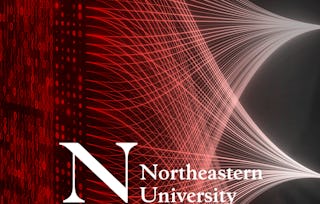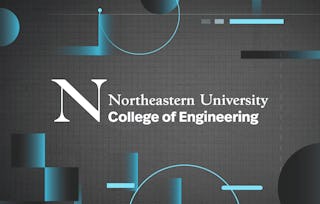This course covers practical algorithms and the theory for machine learning from a variety of perspectives. Topics include supervised learning (generative, discriminative learning, parametric, non-parametric learning, deep neural networks, support vector Machines), unsupervised learning (clustering, dimensionality reduction, kernel methods). The course will also discuss recent applications of machine learning, such as computer vision, data mining, natural language processing, speech recognition and robotics. Students will learn the implementation of selected machine learning algorithms via python and PyTorch.

Statistical Learning for Engineering Part 1

Skills you'll gain
- Unstructured Data
- Applied Machine Learning
- Machine Learning Software
- Unsupervised Learning
- Predictive Analytics
- Artificial Intelligence and Machine Learning (AI/ML)
- Supervised Learning
- Machine Learning
- Predictive Modeling
- Machine Learning Algorithms
- Deep Learning
- Statistical Methods
- Statistical Machine Learning
- Dimensionality Reduction
- PyTorch (Machine Learning Library)
- Classification Algorithms
- Model Evaluation
- Regression Analysis
- Statistical Modeling
- Logistic Regression
- Skills section collapsed. Showing 7 of 20 skills.
Details to know

Add to your LinkedIn profile
9 assignments
See how employees at top companies are mastering in-demand skills

There are 7 modules in this course
This week’s module introduces the field of statistical learning, exploring its scope and practical applications across various domains. Students will analyze how statistical learning techniques are used to make predictions, infer relationships, and uncover patterns in complex datasets. The module also reviews the key concepts essential for success in the course, including statistical models, data handling, and learning algorithms. By the end of the module, students will have a solid understanding of statistical learning principles and be prepared to apply them in real-world scenarios, laying the foundation for deeper exploration in machine learning and data science.
What's included
3 videos7 readings1 assignment
This week’s module introduces you to the concept of Maximum Likelihood Estimation (MLE) and its application in statistical modeling. Through this material, you will gain a thorough understanding of how to mathematically implement MLE and apply it to real-world datasets. First, we will revisit foundational concepts of convex optimization, offering a solid foundation in optimization techniques. We will also explore the iterative process of the gradient descent algorithm, allowing you to understand and implement this method for finding optimal solutions in machine learning models. Through a combination of theoretical knowledge and practical application, you will build essential skills in statistical estimation and optimization, preparing for advanced studies in machine learning and data analysis.
What's included
2 videos3 readings2 assignments
In this module, you will gain a comprehensive understanding of supervised machine learning, from model training to evaluation. Specifically, you will interpret each step in the learning process and apply training and evaluation techniques to real-world data. This will enable you to fit and assess models, while addressing issues like overfitting and underfitting. By understanding the bias-variance trade-off, you can optimize models for greater accuracy and reliability. We will also cover cross-validation methods, further equipping you with robust tools for model assessment and performance analysis. In short, this week’s learning combines theoretical insights with hands-on programming, preparing you for advanced work in machine learning.
What's included
2 videos4 readings2 assignments
This week, we will focus on the foundational principles of linear regression, a key technique in predictive modeling. You will learn to apply linear regression models and derive the ordinary least squares (OLS) formulation, gaining insight into how OLS is used to fit data accurately. We will also cover solution methods, including gradient descent and convex optimization, which provide a toolkit for efficient model training. Finally, you will explore regularization techniques to enhance model robustness and prevent overfitting. By implementing these regularized regression models in Python, you will gain hands-on experience in model optimization.
What's included
1 video3 readings1 assignment
This week, we will dive into advanced techniques for linear regression, with a focus on regularization. You will have the opportunity to explore the concepts of Lasso and Ridge regression and learn how to formulate and apply these regularization methods to linear models. The module also covers polynomial regression, allowing you to fit more complex nonlinear relationships within data. Through hands-on exercises, you will implement Lasso, Ridge, and polynomial regression models in Python. By the end of this week, you will have the practical knowledge needed to apply regularized regression techniques effectively, making the models more resilient and adaptable in real-world scenarios.
What's included
1 video3 readings1 assignment
This week’s module offers a comprehensive introduction to logistic regression, a fundamental technique in classification tasks. You will learn to apply logistic regression to binary and multi-class classification problems, starting with the derivation of the maximum likelihood formulation specific to logistic models. We will also explore generalized linear models (GLMs) and their application in classification, broadening your understanding of model flexibility across various scenarios. Practical exercises focus on implementing logistic regression in Python, enabling you to gain hands-on experience with real-world data. By the end of this module, you will be well-prepared to tackle classification challenges with logistic regression and GLMs, applying statistical theory alongside programming skills.
What's included
2 videos3 readings1 assignment
This week, we introduce Support Vector Machines (SVMs) as a powerful tool for discriminative classification. You will start by understanding the mathematical formulation of SVMs, focusing on margin optimization to maximize model separation between classes. We then delve into various kernel functions—linear, polynomial, and Gaussian—highlighting their unique applications and effects on classification. You will also learn techniques for hyperparameter tuning to optimize SVM performance, adapting models for complex datasets. You will also gain hands-on experience in building and refining SVM models to effectively use SVMs for a wide range of classification tasks in machine learning.
What's included
1 video5 readings1 assignment
Instructors


Offered by
Explore more from Probability and Statistics
 Status: Preview
Status: PreviewNortheastern University
 Status: Preview
Status: PreviewNortheastern University
 Status: Free Trial
Status: Free Trial Status: Free Trial
Status: Free TrialUniversity of Glasgow
Why people choose Coursera for their career

Felipe M.

Jennifer J.

Larry W.

Chaitanya A.

Open new doors with Coursera Plus
Unlimited access to 10,000+ world-class courses, hands-on projects, and job-ready certificate programs - all included in your subscription
Advance your career with an online degree
Earn a degree from world-class universities - 100% online
Join over 3,400 global companies that choose Coursera for Business
Upskill your employees to excel in the digital economy
Frequently asked questions
To access the course materials, assignments and to earn a Certificate, you will need to purchase the Certificate experience when you enroll in a course. You can try a Free Trial instead, or apply for Financial Aid. The course may offer 'Full Course, No Certificate' instead. This option lets you see all course materials, submit required assessments, and get a final grade. This also means that you will not be able to purchase a Certificate experience.
When you purchase a Certificate you get access to all course materials, including graded assignments. Upon completing the course, your electronic Certificate will be added to your Accomplishments page - from there, you can print your Certificate or add it to your LinkedIn profile.
Yes. In select learning programs, you can apply for financial aid or a scholarship if you can’t afford the enrollment fee. If fin aid or scholarship is available for your learning program selection, you’ll find a link to apply on the description page.
More questions
Financial aid available,

